
Captain James Hook is the main antagonist of J. M. Barrie's 1904 play Peter Pan; or, the Boy Who Wouldn't Grow Up and its various adaptations, in which he is Peter Pan's archenemy. The character is a pirate captain of the brig Jolly Roger. His two principal fears are the sight of his own blood and the crocodile who pursues him after eating the hand cut off by Pan. An iron hook replaced his severed hand, which gave the pirate his name.

In Which We Serve is a 1942 British patriotic war film directed by Noël Coward and David Lean, who made his debut as a director. It was made during the Second World War with the assistance of the Ministry of Information.
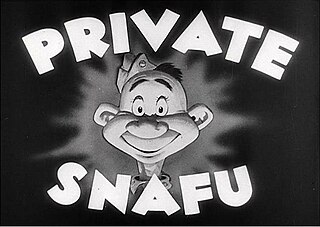
Private Snafu is the title character of a series of black-and-white American instructional adult animated shorts, ironic and humorous in tone, that were produced between 1943 and 1945 during World War II. The films were designed to instruct service personnel about security, proper sanitation habits, booby traps and other military subjects, and to improve troop morale. Primarily, they demonstrate the negative consequences of doing things wrong. The main character's name is a play on the military slang acronym SNAFU, "Situation Normal: All Fucked Up". The cleaned-up version of that phrase, usually used on radio and in print, was "Situation Normal: All Fouled Up".

Hans Georg Conried Jr. was an American actor and comedian. He was known for providing the voices of George Darling and Captain Hook in Walt Disney's Peter Pan (1953), Snidely Whiplash in Jay Ward's Dudley Do-Right cartoons, Professor Waldo P. Wigglesworth in Ward's Hoppity Hooper cartoons, was host of Ward's "Fractured Flickers" and Professor Kropotkin on the radio and film versions of My Friend Irma. He also appeared as Uncle Tonoose on Danny Thomas' sitcom Make Room for Daddy, and twice on I Love Lucy.
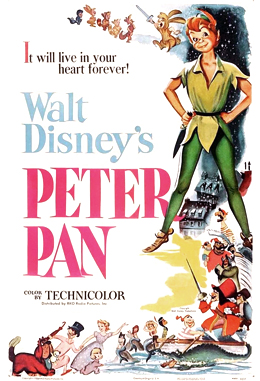
Peter Pan is a 1953 American animated adventure fantasy film produced in 1952 by Walt Disney Productions and released by RKO Radio Pictures. Based on J. M. Barrie's 1904 play Peter Pan, or the Boy Who Wouldn't Grow Up, the film was directed by Hamilton Luske, Clyde Geronimi, and Wilfred Jackson. Featuring the voices of Bobby Driscoll, Kathryn Beaumont, Hans Conried, and Bill Thompson, the film's plot follows Wendy Darling and her two brothers, who meet the never-growing-up Peter Pan and travel with him to the island of Never Land to stay young, where they also have to face Peter's archenemy, Captain Hook.
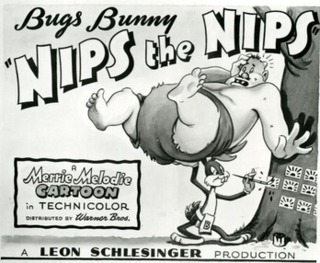
Bugs Bunny Nips the Nips is a 1944 Merrie Melodies cartoon directed by Friz Freleng. The cartoon, released on April 22, 1944, features Bugs Bunny. The film depicts Bugs fighting against the Imperial Japanese Army in the Pacific War. The film is considered controversial for caricaturing the Japanese enemy, and expressing anti-Japanese sentiment.

The Long and the Short and the Tall is a 1961 British war film directed by Leslie Norman and starring Richard Todd, Laurence Harvey and Richard Harris. The film, which is based on a 1959 play with the same name, by Willis Hall, takes place in 1942 during the Malayan Campaign.
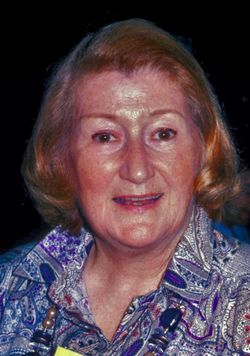
Frances Mary Ryan was an American character actress featured in television and films. She was born in Los Angeles, California.
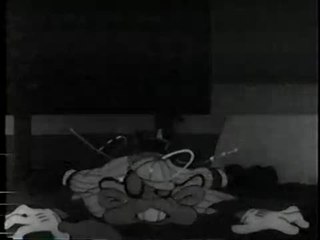
Tokio Jokio is a 1943 Looney Tunes propaganda short directed by Norman McCabe. The cartoon is notorious and controversial for its racist depictions of Japanese people. This is also noted for being the final Norman McCabe cartoon.

December 7th is a 1943 propaganda documentary film produced by the US Navy and directed by Gregg Toland and John Ford, about the December 7, 1941 attack on Pearl Harbor, the event which sparked the Pacific War and American involvement in World War II. Toland was also the film's cinematographer and co-writer. The original version of this film, with a running time of 82 minutes, was not released but was retained by the National Archives. An edited version of 32 minutes length, which removed a long introductory segment and a shorter epilogue, was given limited release to specific audiences but won the Academy Award for Best Documentary in 1944. This is the only film Toland ever worked on for which he received a director credit.
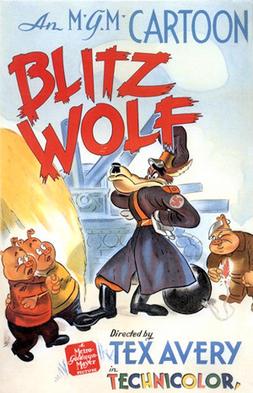
Blitz Wolf is a 1942 American animated propaganda short film produced and distributed by Metro-Goldwyn-Mayer. A parody of the Three Little Pigs told via a World War II perspective, the short was directed by Tex Avery and produced by Fred Quimby. It was nominated for the Academy Award for Best Short Subject: Cartoons but lost to Der Fuehrer's Face, another anti-Nazi World War II parody featuring Donald Duck.

Kenneth Marlar Taylor was a United States Air Force officer and a flying ace of World War II. He was a new United States Army Air Corps second lieutenant pilot stationed at Wheeler Field during the Japanese attack on Pearl Harbor on December 7, 1941. Along with his fellow pilot and friend George Welch, Taylor managed to get a fighter plane airborne under fire. Taylor claimed to have shot down four Japanese dive bombers but only two were confirmed. Taylor was injured during the incident and received several awards for his efforts, including the Distinguished Service Cross and the Purple Heart.

Japoteurs (1942) is the tenth of seventeen animated Technicolor short films based upon the DC Comics character of Superman, originally created by Jerry Siegel and Joe Shuster. The first Superman cartoon produced by Famous Studios, Japoteurs covers Superman's adventures stopping Japanese spies from hijacking a bomber plane and bringing it to Tokyo. This cartoon does not bear the Famous Studios name because that company had not yet been fully organized after Max Fleischer was removed by Paramount Pictures from the studio which bore his name. The cartoon was originally released to theaters by Paramount Pictures on September 18, 1942. Japoteurs was the first Famous Studios cartoon filmed in color.
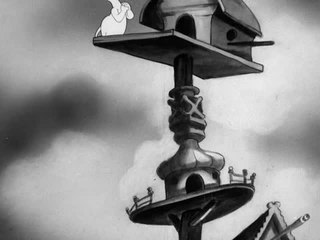
The Ducktators is a 1942 Warner Bros. Looney Tunes short directed by Norman McCabe. The short was released on August 1, 1942, and satirizes events of World War II. The title is a pun on dictator.
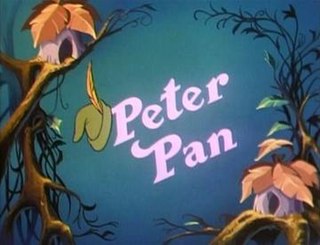
Peter Pan is an Australian 50-minute direct-to-video animated film from Burbank Films Australia. It was originally released in 1988. The film is based on J. M. Barrie's 1911 novel Peter and Wendy adapted by Paul Leadon, which was in turn based on the 1904 play Peter Pan; or, the Boy Who Wouldn't Grow Up. Peand was adapted by Paul Leadon. The film was produced by Roz Phillips and featured music composed by John Stuart. The copyright in this film is now owned by Pulse Distribution and Entertainment and administered by digital rights management firm NuTech Digital.
World War II changed the possibilities for animation. Prior to the war, animation was mostly seen as a form of family entertainment. The attack on Pearl Harbor was a turning point in its utility. On December 8, 1941, the United States Army began working with Walt Disney at his studio, stationing Military personnel there for the duration of the war. The Army and Disney set about making various types of films for several different audiences. Most films meant for the public included some type of propaganda, while films for the troops included training and education about a given topic.
Mr. Hook is the title character of a series of American animated cartoon shorts produced between 1943 and 1945 during World War II for the US Navy. The series included for 4 shorts with the first by Walter Lantz Productions being produced in full color and the remaining three produced by Warner Bros. Cartoons in black and white. The character was designed by Hank Ketcham. Unlike the earlier Private Snafu series, which was created as an instructional film series, Mr. Hook was created exclusively as propaganda to encourage Navy personnel to purchase war bonds.

Hideki Tojo was a Japanese politician, military leader and convicted war criminal who served as prime minister of Japan and president of the Imperial Rule Assistance Association from 1941 to 1944 during World War II. He assumed several more positions including chief of staff of the Imperial Army before ultimately being removed from power in July 1944. During his years in power, his leadership was marked by extreme state-perpetrated violence in the name of Japanese ultranationalism, much of which he was personally involved in.

Scrap the Japs is a 1942 American anti-Japanese cartoon with the popular character Popeye as protagonist. It follows his adventures after being sent for punishment on a ship and running into Japanese sailors.
















